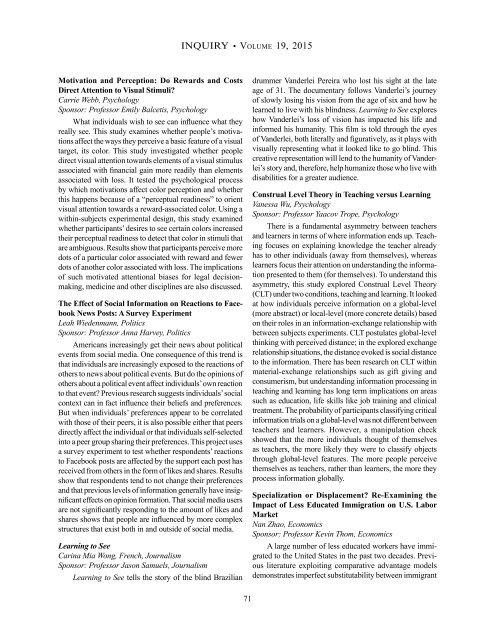INQUIRY
InquiryXIX
InquiryXIX
Create successful ePaper yourself
Turn your PDF publications into a flip-book with our unique Google optimized e-Paper software.
<strong>INQUIRY</strong> • Volume 19, 2015<br />
Motivation and Perception: Do Rewards and Costs<br />
Direct Attention to Visual Stimuli?<br />
Carrie Webb, Psychology<br />
Sponsor: Professor Emily Balcetis, Psychology<br />
What individuals wish to see can influence what they<br />
really see. This study examines whether people’s motivations<br />
affect the ways they perceive a basic feature of a visual<br />
target, its color. This study investigated whether people<br />
direct visual attention towards elements of a visual stimulus<br />
associated with financial gain more readily than elements<br />
associated with loss. It tested the psychological process<br />
by which motivations affect color perception and whether<br />
this happens because of a “perceptual readiness” to orient<br />
visual attention towards a reward-associated color. Using a<br />
within-subjects experimental design, this study examined<br />
whether participants’ desires to see certain colors increased<br />
their perceptual readiness to detect that color in stimuli that<br />
are ambiguous. Results show that participants perceive more<br />
dots of a particular color associated with reward and fewer<br />
dots of another color associated with loss. The implications<br />
of such motivated attentional biases for legal decisionmaking,<br />
medicine and other disciplines are also discussed.<br />
The Effect of Social Information on Reactions to Facebook<br />
News Posts: A Survey Experiment<br />
Leah Wiedenmann, Politics<br />
Sponsor: Professor Anna Harvey, Politics<br />
Americans increasingly get their news about political<br />
events from social media. One consequence of this trend is<br />
that individuals are increasingly exposed to the reactions of<br />
others to news about political events. But do the opinions of<br />
others about a political event affect individuals’ own reaction<br />
to that event? Previous research suggests individuals’ social<br />
context can in fact influence their beliefs and preferences.<br />
But when individuals’ preferences appear to be correlated<br />
with those of their peers, it is also possible either that peers<br />
directly affect the individual or that individuals self-selected<br />
into a peer group sharing their preferences. This project uses<br />
a survey experiment to test whether respondents’ reactions<br />
to Facebook posts are affected by the support each post has<br />
received from others in the form of likes and shares. Results<br />
show that respondents tend to not change their preferences<br />
and that previous levels of information generally have insignificant<br />
effects on opinion formation. That social media users<br />
are not significantly responding to the amount of likes and<br />
shares shows that people are influenced by more complex<br />
structures that exist both in and outside of social media.<br />
Learning to See<br />
Carina Mia Wong, French, Journalism<br />
Sponsor: Professor Jason Samuels, Journalism<br />
Learning to See tells the story of the blind Brazilian<br />
drummer Vanderlei Pereira who lost his sight at the late<br />
age of 31. The documentary follows Vanderlei’s journey<br />
of slowly losing his vision from the age of six and how he<br />
learned to live with his blindness. Learning to See explores<br />
how Vanderlei’s loss of vision has impacted his life and<br />
informed his humanity. This film is told through the eyes<br />
of Vanderlei, both literally and figuratively, as it plays with<br />
visually representing what it looked like to go blind. This<br />
creative representation will lend to the humanity of Vanderlei’s<br />
story and, therefore, help humanize those who live with<br />
disabilities for a greater audience.<br />
Construal Level Theory in Teaching versus Learning<br />
Vanessa Wu, Psychology<br />
Sponsor: Professor Yaacov Trope, Psychology<br />
There is a fundamental asymmetry between teachers<br />
and learners in terms of where information ends up. Teaching<br />
focuses on explaining knowledge the teacher already<br />
has to other individuals (away from themselves), whereas<br />
learners focus their attention on understanding the information<br />
presented to them (for themselves). To understand this<br />
asymmetry, this study explored Construal Level Theory<br />
(CLT) under two conditions, teaching and learning. It looked<br />
at how individuals perceive information on a global-level<br />
(more abstract) or local-level (more concrete details) based<br />
on their roles in an information-exchange relationship with<br />
between subjects experiments. CLT postulates global-level<br />
thinking with perceived distance; in the explored exchange<br />
relationship situations, the distance evoked is social distance<br />
to the information. There has been research on CLT within<br />
material-exchange relationships such as gift giving and<br />
consumerism, but understanding information processing in<br />
teaching and learning has long term implications on areas<br />
such as education, life skills like job training and clinical<br />
treatment. The probability of participants classifying critical<br />
information trials on a global-level was not different between<br />
teachers and learners. However, a manipulation check<br />
showed that the more individuals thought of themselves<br />
as teachers, the more likely they were to classify objects<br />
through global-level features. The more people perceive<br />
themselves as teachers, rather than learners, the more they<br />
process information globally.<br />
Specialization or Displacement? Re-Examining the<br />
Impact of Less Educated Immigration on U.S. Labor<br />
Market<br />
Nan Zhao, Economics<br />
Sponsor: Professor Kevin Thom, Economics<br />
A large number of less educated workers have immigrated<br />
to the United States in the past two decades. Previous<br />
literature exploiting comparative advantage models<br />
demonstrates imperfect substitutability between immigrant<br />
71


